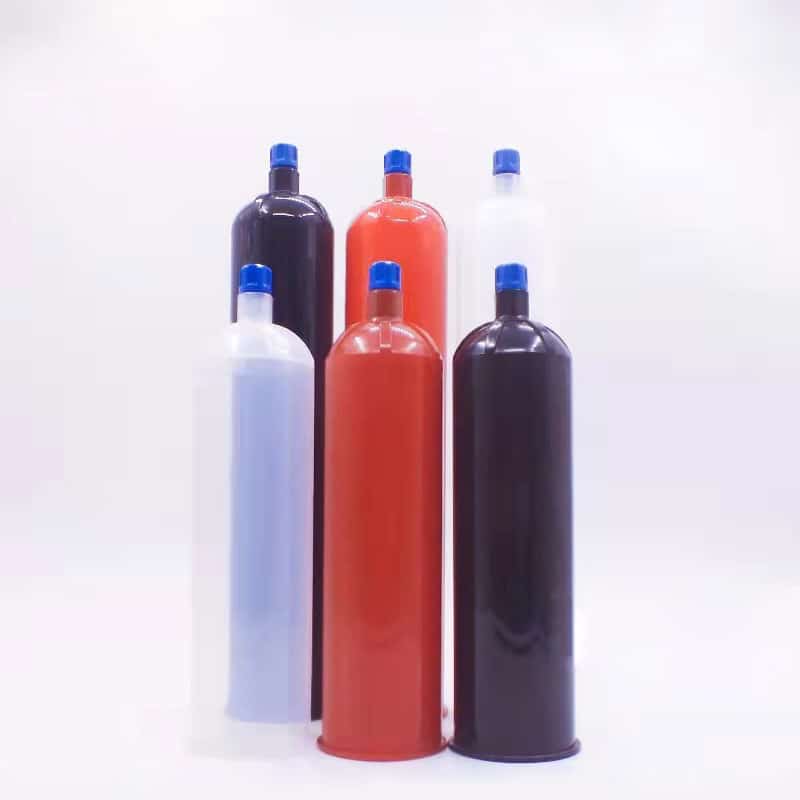Pressure syringe barrels are specialized containers used for dispensing fluids with precision and control. They are designed to withstand high pressures generated during dispensing, ensuring accurate and consistent application of adhesives, sealants, lubricants, and other fluids. Pressure syringe barrels are commonly used in industries such as electronics manufacturing, automotive assembly, and medical device manufacturing, where precise dispensing is critical.

Benefits of Pressure Syringe Barrels
Pressure syringe barrels offer several advantages over other dispensing methods, making them a popular choice in various industries. Here are some key benefits:
Precise Dispensing: Pressure syringe barrels allow for precise control over the dispensing of fluids, ensuring accurate placement and consistent bead sizes.
Reduced Waste: The controlled dispensing offered by pressure syringe barrels helps minimize waste, as only the required amount of fluid is dispensed.
Increased Efficiency: Pressure syringe barrels can improve efficiency in manufacturing processes by speeding up dispensing operations and reducing the need for rework.
Versatility: Pressure syringe barrels can be used with a wide range of fluids, including adhesives, sealants, lubricants, and more, making them suitable for diverse applications.
Cost-Effectiveness: While the initial cost of pressure syringe barrels and dispensing systems may be higher than other dispensing methods, their precision and efficiency can lead to cost savings in the long run.
Consistent Results: Pressure syringe barrels provide consistent dispensing results, reducing variability and ensuring high-quality finished products.
Ease of Use: Pressure syringe barrels are relatively easy to use, requiring minimal training for operators to achieve reliable dispensing results.
Compatibility with Automation: Pressure syringe barrels can be easily integrated into automated dispensing systems, further improving efficiency and reducing manual labor.
Types of Pressure Syringe Barrels
Pressure syringe barrels are available in various types and configurations to suit different dispensing needs. Here are some common types of pressure syringe barrels:
Metal Syringe Barrels: Metal syringe barrels, typically made of stainless steel or aluminum, are known for their durability and resistance to high pressures. They are suitable for dispensing a wide range of fluids, including adhesives, sealants, and solder pastes.
Plastic Syringe Barrels: Plastic syringe barrels, often made of high-density polyethylene (HDPE) or other plastics, are lightweight and cost-effective. They are suitable for dispensing less viscous fluids and are often used in applications where metal syringe barrels may be too heavy or expensive.
Luer Lock Syringe Barrels: Luer lock syringe barrels feature a threaded tip that securely attaches to dispensing tips, ensuring a leak-proof connection. They are commonly used in applications where precise dispensing is required, such as in medical device manufacturing.
Threaded Syringe Barrels: Threaded syringe barrels have a threaded tip that allows them to be easily attached to dispensing tips or adapters. They are versatile and can be used with a wide range of fluids and dispensing systems.
Catheter Tip Syringe Barrels: Catheter tip syringe barrels have a tapered tip that is ideal for dispensing fluids into narrow or hard-to-reach areas. They are commonly used in medical applications, such as catheter assembly.
Air-Tight Syringe Barrels: Air-tight syringe barrels are designed to prevent air from entering the barrel, which can cause bubbles or inconsistencies in the dispensed fluid. They are used in applications where air-free dispensing is critical, such as in electronics manufacturing.
Applications of Pressure Syringe Barrels
Pressure syringe barrels are used in a wide range of industries and applications where precise dispensing of fluids is required. Some common applications include:
Electronics Manufacturing: Pressure syringe barrels are used in electronics manufacturing for dispensing adhesives, sealants, and solder pastes onto circuit boards. They help ensure accurate placement of components and reliable solder joints.
Automotive Assembly: In the automotive industry, pressure syringe barrels are used for dispensing adhesives, sealants, and lubricants during vehicle assembly. They are also used for bonding and sealing applications in automotive electronics.
Medical Device Manufacturing: Pressure syringe barrels are used in the manufacture of medical devices for dispensing adhesives, sealants, and other fluids used in medical devices. They are also used in catheter assembly and other medical applications.
Aerospace and Aviation: Pressure syringe barrels are used in the aerospace and aviation industries for bonding and sealing applications. They are also used for potting and encapsulation of electronic components in aerospace applications.
Construction and Building Materials: Pressure syringe barrels are used in the construction industry for dispensing adhesives, sealants, and coatings. They are also used for grouting and concrete repair applications.
Consumer Electronics: In the consumer electronics industry, pressure syringe barrels are used for dispensing adhesives, sealants, and coatings in the manufacture of smartphones, tablets, and other electronic devices.
General Manufacturing: Pressure syringe barrels are used in various other manufacturing industries for dispensing a wide range of fluids, including adhesives, sealants, lubricants, and coatings.
Choosing the Right Pressure Syringe Barrel
Selecting the right pressure syringe barrel for your dispensing application is crucial to achieving accurate and consistent results. Here are some factors to consider when choosing a pressure syringe barrel:
Fluid Compatibility: Ensure that the pressure syringe barrel is compatible with the fluid you will be dispensing. Consider factors such as chemical compatibility, viscosity, and flow rate requirements.
Size and Capacity: Choose a pressure syringe barrel with the right size and capacity for your application. Consider the volume of fluid you need to dispense and the size of the dispensing area.
Material: Pressure syringe barrels are available in a variety of materials, including stainless steel, aluminum, and plastic. Choose a material that is compatible with your fluid and offers the necessary durability and pressure resistance.
Dispensing Tip Compatibility: Consider the type of dispensing tip you will be using and ensure that the pressure syringe barrel is compatible with it. Some pressure syringe barrels feature a luer lock or threaded tip for easy attachment of dispensing tips.
Pressure Rating: Choose a pressure syringe barrel with a pressure rating that meets the requirements of your dispensing application. Consider the maximum pressure that will be applied during dispensing.
Ease of Use: Consider the ease of filling, dispensing, and cleaning the pressure syringe barrel. Look for features such as a removable plunger and easy-to-clean materials.
Cost: Consider the cost of the pressure syringe barrel and factor it into your budget. Balance cost with quality and suitability for your application.
By carefully considering these factors, you can choose the right pressure syringe barrel for your dispensing application, ensuring accurate and reliable dispensing results.
Maintenance and Care of Pressure Syringe Barrels
Proper maintenance and care of pressure syringe barrels are essential to ensure their longevity and performance. Here are some tips for maintaining and caring for pressure syringe barrels:
Cleaning: Regularly clean pressure syringe barrels after each use to prevent buildup of dried or hardened fluids. Use appropriate cleaning solvents and follow the manufacturer’s recommendations.
Storage: Store pressure syringe barrels in a clean, dry place away from direct sunlight and extreme temperatures. Ensure that they are stored upright to prevent leakage.
Inspect for Damage: Regularly inspect pressure syringe barrels for signs of damage, such as cracks, dents, or leaks. Replace any damaged barrels immediately to prevent potential issues during dispensing.
Replace Seals and O-Rings: Periodically check the seals and O-rings of pressure syringe barrels for wear or damage. Replace them as needed to maintain a proper seal and prevent leaks.
Use Compatible Fluids: Use only fluids that are compatible with the material of the pressure syringe barrel to prevent damage or deterioration of the barrel.
Avoid Overfilling: Do not overfill pressure syringe barrels, as this can cause leakage and affect dispensing accuracy. Fill the barrel only to the recommended capacity.
Follow Manufacturer’s Recommendations: Follow the manufacturer’s recommendations for maintenance, cleaning, and care of pressure syringe barrels to ensure optimal performance and longevity.
Safety Considerations When Using Pressure Syringe Barrels
While pressure syringe barrels are valuable tools for precise fluid dispensing, it’s important to follow safety guidelines to prevent accidents and ensure safe operation. Here are some safety considerations to keep in mind when using pressure syringe barrels:
Wear Personal Protective Equipment (PPE): Always wear appropriate PPE, such as gloves and safety goggles, when handling pressure syringe barrels and dispensing fluids to protect against chemical exposure and injuries.
Follow Manufacturer’s Instructions: Read and follow the manufacturer’s instructions for the pressure syringe barrels and dispensing systems to ensure safe and proper use.
Avoid Over-pressurization: Do not exceed the maximum pressure rating of the pressure syringe barrel to prevent ruptures or leaks.
Use in Well-Ventilated Areas: Use pressure syringe barrels in well-ventilated areas to avoid inhaling fumes from the dispensed fluids.
Avoid Contact with Skin: Avoid direct contact with the dispensed fluids, as they may be hot or contain harmful chemicals. In case of contact, rinse immediately with plenty of water and seek medical attention if necessary.
Dispose of Waste Properly: Dispose of used pressure syringe barrels and any leftover fluids according to local regulations for hazardous waste disposal.
Store Properly: Store pressure syringe barrels and fluids in a safe manner, away from heat sources, open flames, and incompatible materials.
Emergency Preparedness: Have an emergency response plan in place in case of accidents or spills involving pressure syringe barrels. This should include procedures for containing spills and contacting emergency services if needed.
